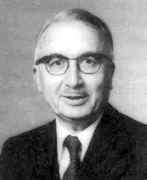Person: Cartan (2), Henri

Henri Cartan was a French mathematiician who was one of the original Bourbakistes.
Mathematical Profile (Excerpt):
- Although always prepared to answer Henri's questions about mathematics as he was growing up, he never emphasised the subject more than others.
- Despite this Henri always knew from a very young age that he would be a mathematician.
- After completing his school education Henri studied at the École Normale Supérieure in Paris and soon became friendly with André Weil who was one year ahead.
- The students at the École Normale also had to attend general courses at the Sorbonne, so Henri studied there too.
- His doctoral studies were supervised by Paul Montel, whose research interests were the theory of analytic functions of a complex variable, and Cartan received his Docteur ès Sciences mathématiques in 1928.
- After being awarded his doctorate, Cartan taught at the Lycée Caen from 1928 to 1929, then at the University of Lille from 1929 to 1931.
- It had been Cartan's friend André Weil who had suggested that he work on analytic functions of several complex variables and Weil told him about the work of Carathéodory.
- Cartan published Les transformations analytiques des domaines cerclés les uns dans les autres Ⓣ(Analytical transformations of bounded spaces into each other) in 1930 and, since this paper contained generalisations of results proved by Heinrich Behnke, he was invited by Behnke to visit Germany in May 1931 and give a series of lectures at Münster in Westphalen where Behnke taught.
- Most of the time the two mathematicians worked independently, but for this paper they were able to use Élie Cartan's expertise on Lie groups to tackle questions that Henri had been interested in.
- The year in which this joint paper appeared was the one when Cartan left his position in Lille and, starting in November 1931, he took up a post at the University of Strasbourg.
- A very important part of Cartan's mathematical life was taken up with Bourbaki.
- In addition to Henri Cartan the founding members of Bourbaki at that July meeting were André Weil, Jean Dieudonné, Szolem Mandelbrojt, Claude Chevalley, René de Possel, and Jean Delsarte.
- We explained above that Cartan was appointed professor at the Sorbonne in Paris in November 1940.
- At the École Normale Supérieure he started the Séminaire Cartan at the time that Serre was one of his doctoral students.
- It was Serre who suggested that the seminars should be written up for publication and fifteen ENS-Seminars written by Cartan were published between 1948 and 1964.
- Cartan worked on analytic functions, the theory of sheaves, homological theory, algebraic topology and potential theory, producing significant developments in all these areas.
- A central figure in this development has been Henri Cartan, whose series of papers in this field starting in the 1920's dealt with fundamental questions relating to Nevanlinna theory, generalizations of the Mittag-Leffler and Weierstrass theorems to functions of several variables, problems concerned with biholomorphic mappings and the biholomorphic equivalence problem, domains of holomorphy and holomorphic convexity, etc.
- The major developments in the theory from 1930 to 1950 came from Cartan and his school in France, Behnke's school in Münster, and Oka in Japan.
- The central ideas up to that time were synthesized in Cartan's Séminaires in the early 1950's, and these were very influential to the next several generations of mathematicians.
- Cartan's accomplishments were broad and he influenced mathematics through his writing, his teaching, his seminars, and his students in a remarkable manner.
- In particular one cannot appreciate the importance of Cartan's contributions to sheaf theory, Stein manifolds and analytic spaces without studying his 1950/51, 1951/52 and 1953/54 Seminars.
- After the Congress Cartan played a major role in setting up the Comité des Mathématiciens to support Plyushch in particular, and all dissident mathematicians.
- In January 1976 the Soviet authorities released Plyushch which was a major success for Cartan and the Comité des Mathématiciens.
- For his outstanding work in assisting dissidents Cartan received the Pagels Award from the New York Academy of Sciences.
- Cartan is a member of the Académie des Sciences of Paris and of other academies in Europe, the United States, and Japan.
Born 8 July 1904, Nancy, France. Died 13 August 2008, Paris, France.
View full biography at MacTutor
Tags relevant for this person:
Bourbaki, Prize Wolf
Thank you to the contributors under CC BY-SA 4.0! 

- Github:
-

- non-Github:
- @J-J-O'Connor
- @E-F-Robertson
References
Adapted from other CC BY-SA 4.0 Sources:
- O’Connor, John J; Robertson, Edmund F: MacTutor History of Mathematics Archive
